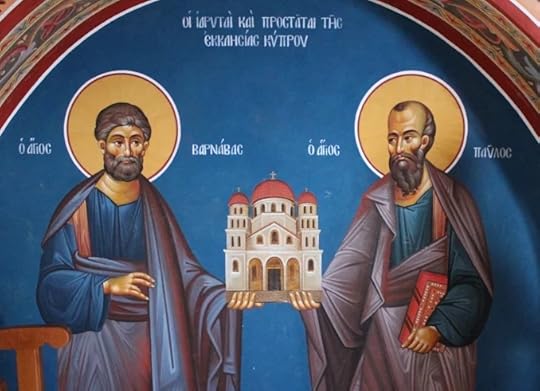Maybe St. Paul Was NOT a Good Mission Strategist?

Paul and Barnabas Ministering in Cyprus
Roland Allen wrote his influential book “Missionary Methods: St. Paul’s or Ours,” published in 1912. The book challenged colonial mission strategies. He suggests that we would gain greatly from following Paul’s mission strategies.
And generally I agree that there were many problems with the traditional way missions was being done (and is still often done). I do also believe that we can gain much by taking seriously the strategies used by Paul in the Book of Acts.
But did the strategies come from Paul? I would like to suggest that Barnabas was the strategist. Of course, I don’t know this. However, there are reasons to suspect this.
#1. The successful strategies used by Paul were primarily associated with his first two missionary journeys— and these were associated with Barnabas. Barnabas and Paul traveled together on the first mission trip. The second mission trip did not include Barnabas, but they had actually planned out the trip together (before their fight). This is far from convincing, but when we see the innovation being associated with them working together, one must wonder who the source of the strategy came from. (more on this in a later point.)
#2. Barnabas was the leader of the first mission trip. This seems pretty clear. For one thing, Luke, the author of Acts, listed Barrnabas before Paul during the early parts of that trip. This is despite the fact that Luke was a disciple of Paul. Second, the people of Lystra seemed to think that Barnabas was the leader. When the decided that Barnabas and Paul must be gods among them, they identified Barnabas as Zeus and Paul as Hermes. This suggests an age difference since Zeus was the father of Hermes. It also suggests possible roles. Zeus was the head/leader of the gods, while Hermes was the messenger of the gods. Perhaps Barnabas was seen as the leader, while Paul did most of the preaching.
#3. Barnabas was likely a mentor of Paul. Barnabas was known as a mentor— his real name was Joseph but was known by his nickname, “Son of Encouragement.” Barnabas was the one who presented Paul to the Twelve and vouched for him. Later he sought out Paul to assist him in his work at the church of Antioch. Later, we see Barnabas in his role as a mentor in his work with his nephew John Mark.
#4. We don’t see much in terms of good mission strategy from Paul after this. The third mission trip was pretty similar to the second. After that Paul’s activities seemed to be pretty suspect in terms of mission strategy. He decided that he needed to go and minister in Jerusalem. The prophet Agabus sought to dissuade him of this as well as other church elders. Paul went anyway and seemed to be generally ineffective. Truthfully, when I read Acts 23, it seems like Luke is pretty uncertain whether Paul was correct in his decision. Later, Paul decided that he needed to go and testify before the Roman Emperor despite the fact that he had opportunities to be released. He ended up wasting, apparently 5 years of his life. It simply does not seem as if he was good at mission strategy when he wasn’t with Barnabas.
Now are there counterarguments here? I think one might argue that his approach to reaching out the Stoics and Epicureans in Athens (Acts 17) does seem to show a very clever strategy. I suppose that contextualization of theology was already established in the first mission trip (if not before in Antioch) with using different methods to reach out to Jews (such as in the synagogues) versus Gentiles (such as the people in Lystra). Still, it could be argued that Paul’s work in Athens (although not seen by some as highly effective) could be a clear demonstration of good strategizing in a new situation.
I am not seeking to minimize the importance of Paul. Paul was a great theologian and a great writer. He was even a great missionary. Paul became a good, perhaps even great mentor. But no one is good at everything. By his own admission, Paul was not seen as a great preacher. He was seen as a much better writer than speaker.
If he was not a great mission strategist, that does not take anything away. God works through teams more than individuals. Paul was a great part of a great team.



